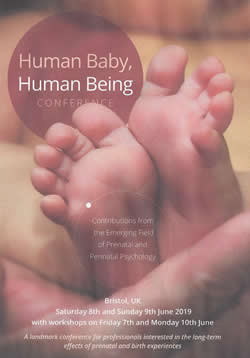USABP Webinar April 19
“Letting go” has long been a central concept in the psychological process of healing. It has been cast/seen as an essential step in getting unstuck and moving forward. Over the years of working with clients through Transformative Touch, the bodies of our clients have opened us to another consideration. In order to let go of something , you first need to be holding on to something. When this is the case, “letting go” makes sense and works. However, we have found with some clients , another scenario has registered in their body- that of something having a hold of it. Letting go in this instance will not work, and will actually increase frustration and self-judgement.
Spring issue of the International Body Psychotherapy Journal is now online.
The spring issue of the International Body Psychotherapy Journal is now online. "The papers in this issue frame our psychological abilities to look within, sense within, be within, and accept what is to be. Our contributors share their research and their explorations into: body awareness; bodily lies and deceptions that impact the quality of our lives; emotional competence through embodiment to facilitate learning; and meeting death with compassion, grace, body-to- body, soul-to-soul. As well, we share a review of biological explanatory models dealing with trauma and the human body." (Editorial Team)
APPPAH’s 19th International Congress
"How does birth impact society? How does society impact birth? Join APPPAH for the 19th International Congress at the Berkeley Marina Double Tree Hotel in Berkeley, CA December 3-6, 2015, to explore the questions and answers.
International Body Psychotherapy Journal Spring 2017 online now
The International Body Psychotherapy Journal announces the publication of their Spring 2017 Journal, available online now.
The Fall 2017 issue of the International Body Psychotherapy Journal, volume 16, number 3,...
The Fall 2017 issue of the International Body Psychotherapy Journal, volume 16, number 3, is now online. This issue marks a significant transition to the IBPJ editorial team. Jill van der Aa, the managing editor since the journal’s inception, is stepping down and Antigone Orepoulou is stepping up for the Spring 2018 issue. We welcome her to the editorial team. The fall issue offers a range of papers. Readers can partake in an in-depth conversation about self-disclosure from a relational body psychotherapy stance, and explore client suffering as potentially originating from civilization then look at how getting in touch adaptively with the body resonates with helping society get in touch sustainably with the ecosystem. The pioneering work of Sabina Spielrein is explored as is the Triphasic Cumulative Microaggression Trauma Processing Model.
APPPAH Offers Free Articles
APPPAH is offering free articles on their website relating to life before birth, prenatal music and sound, the birth experience, birth and violence, prenatal parenting and primal health and womb ecology. They offer a treasure trove of pertinent essays from leaders in the prenatal and perinatal psychology and health field.
The Use of Touch in Psychotherapeutic Praxis Across Traditions
Join international experts as they discuss the various principles involved in touch in psychotherapy practice. Kathy Kain and Aline LaPierre and will be our guests while USABP’s new President, Dr. Chris Walling moderates the panelists in what promises to be an in depth discussion of the various approaches and applications of touch in therapeutic praxis.
International Body Psychotherapy Journal
You are invited to read our review of the 15th European Congress of Body Psychotherapy published in the International Body Psychotherapy Journal.
Attention USABP Conference and EABP Congress Presenters
It’s conference time. Well, okay it’s still almost a year away, but it is time to generate interest in pre-conference workshops, keynote speakers, pull-out sessions, and of course the grand extravaganza (who doesn’t love dinner and dancing?). As our tradition, Somatic Psychotherapy Today will focus its Winter 2016 issue on the upcoming USABP Conference, July 21-23 in Providence, Rhode Island, and the EABP Congress, October 13-16 in Athens, Greece.
The Spring 2017 issue (31-3) of JOPPPAH is now available
Authors Amika Dharmadhikari, Gajanan Kelkar, and Avinash Dharmadhikari of the Manashakti Institute in India generated discussion among the JOPPPAH editorial staff. It is the usual journal policy to publish only articles with unanimous support of the editorial team. Three of the four editorial team members found this article to meet the journal's quality standards for clinical contributions and valued its potential to add a unique cultural perspective. However, our Associate Editor, Dr. Thomas R Verny, dissented on this article over concerns that it did not contribute new insights and that it was not scientifically sound. He also expressed concern about the potential mixing of religion and science. However, since this is rather common in work from India, the rest of the team felt the article merited attention as it does present another cultural perspective that includes recognition of the soul in clinical approaches.













